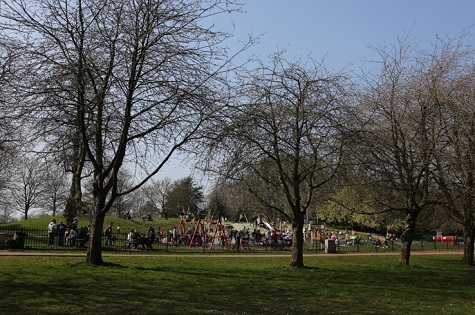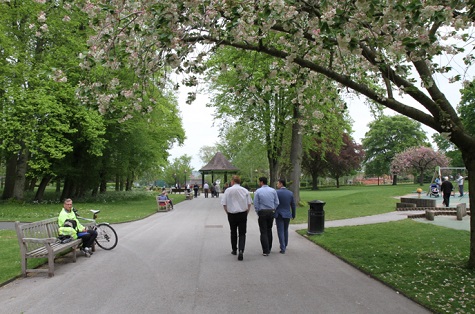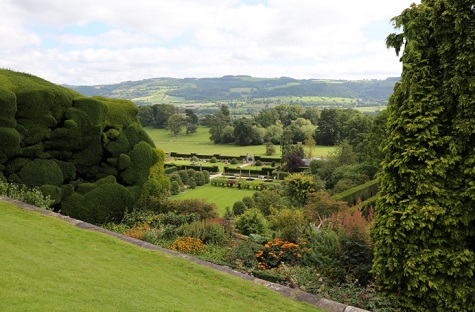As an ex keen sportsman and rugby coach, I am well aware of the benefits of keeping heathy and fit. Over the years I have enjoyed my role coaching sports in clubs and schools and I am pleased that we are finally trying to address this problem of obesity in children and young adults.
We have, over many years, seen an alarming rise in the numbers of children and adults becoming obese due to a combination of factors, generally centred around poor diets, increased stresses and a distinct lack of regular exercise. I firmly believe we, that is to say everyone who works in the sports turf industry and amenity landscape sectors, play an important role in providing essential facilities for people to participate in sport and physical activities. That in turn helps us provide opportunities for people to keep themselves fit and healthy - both mentally and physically.

It is very pleasing to hear about the work being done in Leeds and how they are tackling the obesity crisis of young children.
Leeds has become the first UK city to successfully lower the rates of childhood obesity – according to data from the national child measurement programme (NCMP). Figures from the NCMP show that, over four years, the percentage of children classed as obese has fallen from 11.5 per cent to 10.5 per cent – with the trajectory predicting further decreases going forward.
One of the biggest falls in obesity rates has come at the reception stage (children aged four), which have fallen from 10.3 per cent in 2010 to the current 6.4 per cent.
The fall in obesity rates follows the introduction of a programme called Health, Exercise, Nutrition for the Really Young (HENRY), which is designed to increase levels of physical activity, help parents "set boundaries for their children" and curb the amount of sweets and junk food in childrens' diets.
The intervention programme promotes a healthy start in life and aims to lay the foundations for a healthier future by focusing on babies and children (aged between zero and five years old) and their families.
I know from my dealings with working in the press industry, we read and see a lot of media attention being focussed on this subject. It seems from recent figures, that we are likely to be faced with a national obesity problem that may cost the government billions of pounds to solve in the coming years. I myself have seen at first hand seen an increase in the numbers of overweight people particularly young children. No doubt the result of our modern-day living, convenient transport systems, availability of fast food outlets and less exercise.

Personally, I believe this problem has been going on for many years. Lifestyles have changed particularly in young children who are generally much less active than when I was at school. Also, in the late seventies, schools changed their PE policy, reducing the competitive side to games and PE.
This was followed by the recent austerity measures that has severely affected local authority services over the past two decades, resulting in cutbacks on services and reduced grounds maintenance inputs.
This in turn has led to the reduction in school activities particularly competitive matches between state schools. We now often see a greater disparity between state and independent schools when it comes to sports provision.
There is no doubt in my mind these severe cuts to public services, especially in schools have reduced the quality and availability of valuable playing space that what was once used to keep school children fit and healthy.
You cannot put a price on the value of our public open green spaces and what they can offer in helping solve this obesity crisis. I am pleased to note that finally the government is responding and starting to invest more money into parks and open spaces.
This February the UK Government announced that councils across the country are to benefit from more than £13 million funding to breathe new life into our green spaces for the benefit of all.
From day-to-day maintenance costs to essential playground repairs and the creation of new green spaces, £9.7 million of new funding will give local leaders and communities resources to better maintain, protect and increase their recreational spaces.
An additional £2.75 million will also be made available for the pocket parks plus programme to support communities to take the lead in transforming their neglected and derelict spaces.
As an ex parks manager and current Green Flag judge, I am also very pleased with this news and now more confident that in the coming years we will see some significant investment going back into these much-needed facilities.
Exposure to nature has never been more important than it is today. Businesses can reduce the negative impacts of sterile, lean workplaces and actually enhance their environments by integrating a variety of biophilic features such as green walls, plants, natural woods or stone, and more that mimic the natural world.
The following paragraphs are an extract from an article written by Bernard Sheridan on the provision of Biophilia cities and how this affects our wellbeing and explains the benefits that towns and cities can get from investing in their public open spaces. The concept of biophilia was first used by the German psychologist Erich Fromm, for the instinctive bond between human beings and other living systems, which he considered part of the human ‘state of being’.

“The term is arising more frequently in common usage, with many of the world’s great cities, including Birmingham in the UK, now acclaimed as ‘Biophilic Cities’, and with the Icelandic musical visionary, Bjork, devoting an album and stage performances to the concept. So what is it, and why is it important to green space professionals?
“In the 1990’s Dr William Bird, a family GP from Berkshire started investigating biophilia following concerns about some of his patients who were finding it difficult to motivate themselves to exercise. He was aware of early research about health and green space and was so convinced of the efficacy of walking and taking exercise in parks and green spaces, as separate from the gym, that he collated together all available research to support his belief that nature is good for your health.
“In 2007 he published a synopsis of his findings in his report for the RSPB and Natural England, called Natural Thinking and his conclusions showed clearly that there was convincing evidence for the beneficial impact of being in green space on both physical and mental health. He started the Health Walk and Green Gym movements, which have spread across the world. In 2010 he was awarded an MBE for his work.
“The evidence shows that merely being in good quality green space, even for only fifteen minutes, results in lowered blood pressure, reduced blood toxin levels, reduced stress, improved cognitive performance and enhanced memory retention; any physical exercise taken is a bonus.
“Hospital patients overlooking green spaces and gardens recover quicker, have fewer complications and require less pain relief than those overlooking buildings or car parks.
“The exact mechanism for this effect was not known but the research identified three main theories, none of which exclude the others, to explain how these underpinning health benefits work.
“So, why do we need healthy landscapes, and why does nature make us less stressed? As outlined previously, both the body and mind benefit from the ‘biophilia effect’ in green spaces -we are reconnected with nature and, very quickly, our chronic stress levels are reduced.
“There are the direct effects of nature on the brain; in good green space there are less bad things, less noise, pollution, excess heat and poor aesthetics -and there is more enjoyment and opportunities for physical activity and social interaction.

“This means that the benefits of any physical activity in green spaces are significantly heightened.
“However, research has shown that, as previously mentioned, the benefits of the biophilia effect depend greatly on the quality of green space. Not unexpectedly, evidence reveals our preference for sites to be readily accessible, pleasant, welcoming and appropriately maintained -free from urban nasties such as litter, vandalism damage and graffiti.
“People need to feel safe, unthreatened and comfortable. There needs to be variation and variety in landform, features, planting and terrain; with colour, texture and naturalness, but with sufficiently clear arrangement and vistas, and with places of shelter to prevent it being a threatening wilderness.
“The implications for health services, schools, universities and mental health carers of the phenomenon of improved physical health, mental wellbeing and happiness, through connection with nature and outdoor exercise, is only just beginning to register. The impact on education services and child physical and cognitive development, on tackling the obesity and diabetes crisis, and on the caring professions should be profound.”
Therefore we, that’s all of us who work in the sports turf and amenity sectors, should be proud of the work we do to maintain and sustain these essential community facilities.

I personally would like to see schools particularly; primary schools find more resources to maximise the potential of their playing fields and grounds to help combat obesity in young children.
Schools should also commit more curriculum hours to sport and physical activity for the 5-11 year olds coupled with a healthy eating and education programme that empowers children to have a better understanding of the perils of being obese.